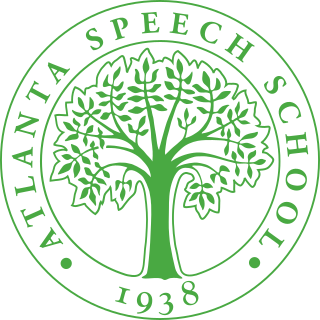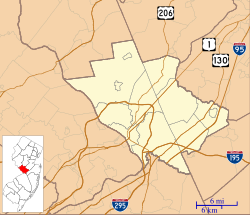
Dyslexia, previously known as word blindness, is a learning disability that affects either reading or writing. Different people are affected to different degrees. Problems may include difficulties in spelling words, reading quickly, writing words, "sounding out" words in the head, pronouncing words when reading aloud and understanding what one reads. Often these difficulties are first noticed at school. The difficulties are involuntary, and people with this disorder have a normal desire to learn. People with dyslexia have higher rates of attention deficit hyperactivity disorder (ADHD), developmental language disorders, and difficulties with numbers.
Nonverbal learning disorder is a proposed neurodevelopmental disorder characterized by core deficits in nonverbal skills, especially visual-spatial processing. People with this condition have normal or advanced verbal intelligence and significantly lower nonverbal intelligence. A review of papers found that proposed diagnostic criteria were inconsistent. Proposed additional diagnostic criteria include intact verbal intelligence, and deficits in the following: visuoconstruction abilities, speech prosody, fine motor coordination, mathematical reasoning, visuospatial memory, and social skills. NVLD is not recognised by the DSM-5 and is not clinically distinct from learning disorders.
A reading disability is a condition in which a person displays difficulty reading. Examples of reading disabilities include developmental dyslexia and alexia.
Community School, located in Teaneck, New Jersey, is a private school, founded in 1968 to serve the bright child with learning and attentional disabilities. The school's primary goal is to help children achieve a level of performance in the classroom that is fully commensurate with their respective abilities. The Lower School program provides children in grades K-8 with skilled remedial help and challenging academic experience. The program is designed for children who have learning disabilities (LD), such as ADD/ADHD, dyslexia, dyscalculia, and Apraxia.

The Craig School is an independent, private coeducational day school located in Mountain Lakes and Montville, in Morris County, in the U.S. state of New Jersey, serving students in second through twelfth grades.

The Gow School is a college-prep boarding and day school located in South Wales, New York, United States, a hamlet close to Buffalo. It is for students, grades 6–12, with dyslexia and similar language-based learning disabilities, such as include developmental coordination disorder, auditory processing disorder, dyscalculia, dysgraphia, and disorder of written expression. Students may also have attention or executive function difficulties. The school was founded in 1926 by educator Peter Gow, along with insight from his colleague, neurologist Dr. Samuel T. Orton.
In the United States, the Individuals with Disabilities Education Act (IDEA) is a special education law that mandates regulation for students with disabilities to protect their rights as students and the rights of their parents. The IDEA requires that all students receive a Free and Appropriate Public Education (FAPE), and that these students should be educated in the least restrictive environment (LRE). To determine what an appropriate setting is for a student, an Individualized Education Plan (IEP) team will review the student's strengths, weaknesses, and needs, and consider the educational benefits from placement in any particular educational setting. By law the team is required to include the student's parent or guardian, a general education teacher, a special education teacher, a representative of the local education agency, someone to interpret evaluation results and, if appropriate, the student. It is the IEP team's responsibility to determine what environment is the LRE for any given student with disabilities, which varies between every student. The goal of an IEP is to create the LRE for that student to learn in. For some students, mainstream inclusion in a standard classroom may be an appropriate setting whereas other students may need to be in a special education classroom full time, but many students fall somewhere within this spectrum. Students may also require supplementary aids and services to achieve educational goals while being placed in a classroom with students without disabilities, these resources are provided as needed. The LRE for a student is less of a physical location, and more of a concept to ensure that the student is receiving the services that they need to be successful.
In clinical diagnostic and functional development, special needs refers to individuals who require assistance for disabilities that may be medical, mental, or psychological. Guidelines for clinical diagnosis are given in both the Diagnostic and Statistical Manual of Mental Disorders and the International Classification of Diseases 9th edition. Special needs can range from people with autism, cerebral palsy, Down syndrome, dyslexia, dyscalculia, dyspraxia, dysgraphia, blindness, deafness, ADHD, and cystic fibrosis. They can also include cleft lips and missing limbs. The types of special needs vary in severity, and a student with a special need is classified as being a severe case when the student's IQ is between 20 and 35. These students typically need assistance in school, and have different services provided for them to succeed in a different setting.
The Orton-Gillingham approach is a multisensory phonics technique for remedial reading instruction developed in the early-20th century. It is practiced as a direct, explicit, cognitive, cumulative, and multi-sensory approach. While it is most commonly associated with teaching individuals with dyslexia, it has been used for non-dyslexic individuals learning to read, spell, and write. In the US, it is promoted by more than 15 commercial programs as well as several private schools for students with dyslexia and related learning disabilities.

The Atlanta Speech School is a language and literacy school located in Atlanta, Georgia, established in 1938. The school provides educational and clinical programs. The Atlanta Speech School's Rollins Center provides professional development for teachers and educators in partner schools and preschools. The Rollins Center focuses on the eradication of illiteracy. The Rollins Center has an online presence called Cox Campus, which is an online learning environment with coursework targeted for the education of children age 0–8.

Learning disability, learning disorder, or learning difficulty is a condition in the brain that causes difficulties comprehending or processing information and can be caused by several different factors. Given the "difficulty learning in a typical manner", this does not exclude the ability to learn in a different manner. Therefore, some people can be more accurately described as having a "learning difference", thus avoiding any misconception of being disabled with a possible lack of an ability to learn and possible negative stereotyping. In the United Kingdom, the term "learning disability" generally refers to an intellectual disability, while conditions such as dyslexia and dyspraxia are usually referred to as "learning difficulties".
Auditory processing disorder (APD), rarely known as King-Kopetzky syndrome, is a neurodevelopmental disorder affecting the way the brain processes sounds. Individuals with APD usually have normal structure and function of the ear, but cannot process the information they hear in the same way as others do, which leads to difficulties in recognizing and interpreting sounds, especially the sounds composing speech. It is thought that these difficulties arise from dysfunction in the central nervous system.

Management of dyslexia depends on a multitude of variables; there is no one specific strategy or set of strategies that will work for all who have dyslexia.
Grace Maxwell Fernald was an educational psychologist and influential figure in early twentieth century literacy education. Fernald established "the first clinic for remedial instruction in 1921 at the University of California, Los Angeles". Tracing tactile learning tendencies back to Quintilian, Séguin, and Montessori, Fernald's kinesthetic spelling and reading method prompted struggling students to trace words. Years of research culminated in 1943 with her classic work, Remedial Techniques in Basic School Subjects. The popular kinesthetic method anchors modern instruction in the areas of special education and remedial reading. Kinesthetic learning is also included as one of Howard Gardner's multiple intelligences. Fernald's notion of incorporating the physical with the auditory, verbal, and visual elements of reading instruction, now known as "VAKT", multimodal learning, or multisensory imagery, continues to guide educators today.

Trident Academy is a school for children with diagnosed learning differences in Mount Pleasant, South Carolina.
The Greenwood School is a specialized boarding and day school for students in grades 6 through 12. Greenwood is situated on a 100-acre campus outside the village of Putney, Vermont in the southeastern part of the state. The Greenwood School is accredited by the New England Association of Schools and Colleges (NEASC), approved by the state of Vermont, and is a member of the National Association of Independent Schools (NAIS).
Language-based learning disabilities or LBLD are "heterogeneous" neurological differences that can affect skills such as listening, reasoning, speaking, reading, writing, and math calculations. It is also associated with movement, coordination, and direct attention. LBLD is not usually identified until the child reaches school age. Most people with this disability find it hard to communicate, to express ideas efficiently and what they say may be ambiguous and hard to understand It is a neurological difference. It is often hereditary, and is frequently associated to specific language problems.
Dyslexia is a reading disorder wherein an individual experiences trouble with reading. Individuals with dyslexia have normal levels of intelligence but can exhibit difficulties with spelling, reading fluency, pronunciation, "sounding out" words, writing out words, and reading comprehension. The neurological nature and underlying causes of dyslexia are an active area of research. However, some experts believe that the distinction of dyslexia as a separate reading disorder and therefore recognized disability is a topic of some controversy.

The Lang School is a private, nonprofit, K-12 school marketing itself as serving the needs of twice exceptional (2e) students located in New York City's Financial District. It was the first K-12 school to specialize in educating twice-exceptional (2e) students, though it later came to include a wider range of gifted students.
Alpine Learning Group is a state funding approved private special education school in Paramus, New Jersey, United States. Established in 1988, the school serves students aged 3 to 21 with autism spectrum disorder, and it is known to be a prestigious educational and research facility utilizing applied behavior analysis (ABA) services.















